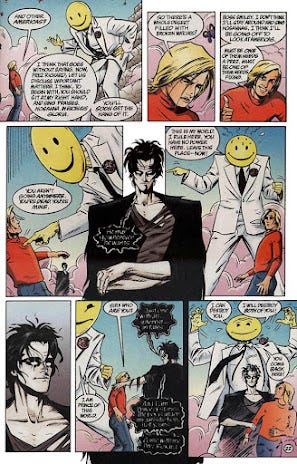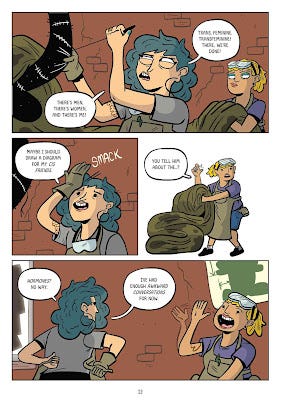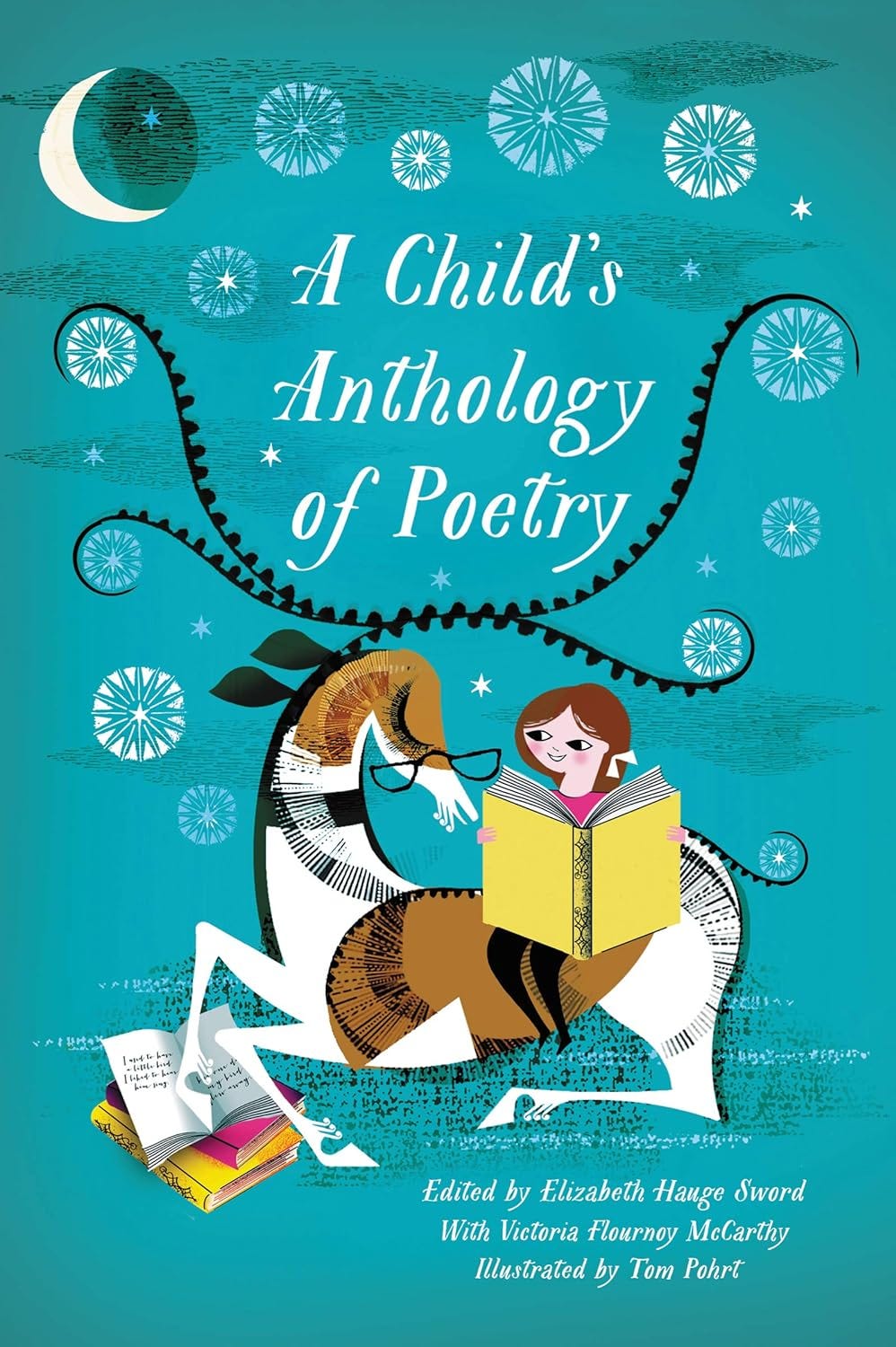Evil Smiley Face, et al.
.
You never know how things will fall down. I would not have guessed my new batch would be nothing but comics or books aimed at children, but so it is. And I have no regrets. Everything here is of good report and praiseworthy, and some of them I even liked!
.
125) The Sandman: Worlds' End by Neil Gaiman et al, finished November 28
This is the one I thought maybe I hadn't read before. When I got into Mike Allred's stuff I discovered that he'd done an issue of Sandman and I could not recall the weird smiley-face guy who came up in searches.
And I was right. I have not read this volume.
It's a Decamerony sort of book, travelers trapped by storms at the inn at the worlds' end come together and tell stories. Brian Talbot's muddy art bookends each issue, with another artist telling the story itself. Allred's is based on a character I had never heard of before. My favorite story might have been that of the girl sailor drawn by Michael Zulli, but Mike's art's my favorite art.
Incidentally, in Gaiman's afterward, he talks about picking Mike Allred for his art, his "clean and simple shapes." Which is crazy because the story digs into many of the theo/cosmological concepts I associate with Allred's later work. I would need to see exactly where this falls among all the Madman comics, but my gut tells me Gaiman's straight up predicted where his artist was headed with his own tales.
Anyway, just four more volumes to go! Wonder if I'll read any more for the first time.
a week
126) Boys Weekend by Mattie Lubchansky, finished November 29
The Washington Post turned me on to this book and luckily my library had it. I put it on hold and it came right away. And it was . . . fine.
I like many things about Boys Weekend: I liked the weird near-future setting, I liked the mundanity of trans experience, I liked the color palette, I liked the pacing, I liked the dumb jokes.
But there were things I did not like as well. For instance, that near-future world was a bit confused. Is this our new future? The protag was born in 1999 and she's, what, thirty? Maybe thirty-five? So this is ten years from now? Not likely. So maybe it's some other world? Honestly, before I saw the birthday, I was assuming this was a hundred years out and my main complaint then would have been that surely the current awkwardnesses between trans folk and their cis friends would at least have evolved into something new. But it feels pretty 2023 to me.
But Theric, you might say, this is a satire! So of course it's really about our current world.
Sure, but you see: near-future is my jam. I care very much about its execution. I can't help it.
My other big complaint is the character design. I feel like this look, new so recently, is deeply overdone by now and I'm over it. I suppose this may be petty. But it's how I feel. Sorry.
Anyway, someone whom I thought had begun transitioning perhaps a decade ago (revealed late in the book to actually be less than a year ago) is invited to Las Vegas on a floating island (everything's legal!) to be the best man at her college-era best friend's weeklong bachelor party. Self-discovery ensues as we pass through satires of tech, techbros, capitalism, morality, and more more more!
Again: lot to like. I do believe lots of people really like this book. Alas that I am not one of them. (Insert sadface here.)
in bed one night
127) Dragon Hoops by Gene Luen Yang, finished December 15
I've seen this book at the library before. it's hard to miss. It's a bright orange basketball of a book. And although I love Yang's work this is a long one. And it looks like a bright orange basketball.
But I finally picked it up which I needed to stand next to the shelves it was on for an extended time and I started reading it and, no surprise, it's excellent.
It's the true story of Bishop O'Dowd's 2015 run for the state championship / the end of Yang's teaching career / the history of basketball / dozens of other things small and large. The book is also about its own creation. But it takes the endnotes to really get behind the process of how the artist sculpted reality into a story. I recommend the endnotes.
And I recommend the whole dang 446 pages. It doesn't take that long to read and you'll be glad you did. A lot of pages gives an artist of Yang's caliber the room to stretch his muscles, to create meaningful motifs and expound themes. Sometimes a longer book is the right choice.
And maybe he'll even do to you what he did to himself—make you like basketball.
since Friday
128) Ramona's World by Beverly Cleary, finished December 6
We did it! The almost-eight-year-old and I read all the Ramona books! Behold:
Ramona and Beezus
Ramona the Pest
Ramona the Brave
Ramona and Her Father
Ramona and Her Mother
Ramona Quimby, Age 8
Ramona Forever
(links to Blogger only as that's where I have anchors for better linking)And now Ramona's World in which, by reaching age zeroteen, she is a teenager.
Ramona continues to grow. She makes new kinds of friendships and desires new kinds of responsibilities. She becomes better capable of empathy but also is moving into an adolescent capacity for embarrassment. Not everything is resolved (her dad, for instance, still hasn't been able to get a job as a teacher) but in life, not everything is.
This was the last novel Cleary published. It came out in her early 80s, and though she made it to juuust shy of 105, she never wrote another. Her skills are still strong in Ramona's World but, well, she'd earned her retirement.
Frankly, these eight books are a terrific accomplishment and we here enjoyed them very much. They're the real stuff.
Thank you, ma'am.
perhaps two months
129) A Child's Anthology of Poetry edited by Elizabeth Hauge Sword with Victoria Flourney McCarthy, finished December 7
This is anthology of poems that work for children. Not necessarily for children. There is some children-intended verse, sure, but there's also a lot of Blake and Frost and Dickinson and Yeats and the like.
This was originally published in 1995 and I don't think a new book making a similar attempt would make some of the same choices. For example, it includes Countee Cullin's "Incident" and one might say rightly so. I forget when I first read it, but I was not an adult and that poem changed me. I think all my understanding of racism and its ugliness can be traced to reading "Incident" in my youth. But it's not going into a book for kids in 2023. And I'm sympathetic to why not. But I can't be sure it would be the right choice. Because changing you—may that not be a primary purpose of poetry?
Of course, a, ah, "funny" thing about leaving incident out in our imaginary 2023 volume is that this is something the left and the right would agree on in almost identical language.
The great thing about a book like this is that no matter how late it is, we still have time for a poem. Even if there's no time for a chapter of Ramona, there is time for a poem. And so reading a poem is now an expected certainty for the almost-eight-year-old.
let's guess a year and seven months but really that's just a guess







